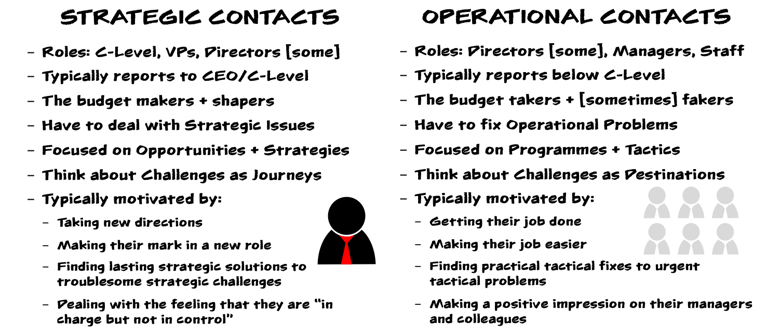B2B Sales: what level are we talking at?
July 25, 2017

 Most high-value complex sales require that we engage with multiple stakeholders at different levels in the customer. If we start at with a contact at the operational level, even if we successfully sell them on the need for action and the advantages of our solution, they will often have to persuade others - usually a combination of their peers and their superiors - before a buying decision can be finalised.
Most high-value complex sales require that we engage with multiple stakeholders at different levels in the customer. If we start at with a contact at the operational level, even if we successfully sell them on the need for action and the advantages of our solution, they will often have to persuade others - usually a combination of their peers and their superiors - before a buying decision can be finalised.
And if we start by successfully engaging a contact at the strategic level that we persuade to buy-in to our vision, it’s pretty much inevitable that in this age of collaborative, consensus-driven decision-making that they will at some point pass us down to people at the operational level so that they can conduct a more detailed evaluation on their behalf.
Wherever we start our conversation, it is always wise to remember some classic advice: “we end up talking to the person we sound like”…
For many top sales performers, this is instinctively obvious - but I’ve observed far too many sales conversations that go rapidly off-piste because the prospect sees the conversation as being irrelevant to them.
It’s probably worth highlighting a few of the distinctive differences between strategic and operational contacts:

AVOIDING MISALIGNED COMMUNICATIONS
It’s hardly any wonder, is it, that there is so much scope - particularly amongst relatively inexperienced sales people - for having the wrong level of communication with the wrong people?
Of course the problem is compounded (as a number of studies have pointed out) by the fact that the typical sales person is far more confident talking about their products than their customer’s business environment, whilst the typical business buyer regards relevant business expertise as far more important than product knowledge.
There’s got to be a way around this, and of course there is: it’s a matter of establishing separate talk tracks for strategic and operational conversations, and coaching sales people in how to handle both levels of conversation.
This is not about coming up with rigid scripts - any customer worth their salt will be able to see through them in an instant. It’s about coming up with a series of connected talking points and insights that are connected with the issues that are most likely to be relevant to the role and level of the audience.
But as I suggested in my introduction, there are times when we might want to deliberately switch the level of conversation up or down in order to progress an opportunity. Here are a couple of examples:
MOVING DOWN WITH A MANDATE
After successfully engaging at the C-Level, we are told that they now want to bring their subject matter experts in to evaluate our solution at a detailed level. There’s a real risk that the project could disappear into a Black Hole at this point. The operational people on whose desks this task lands will often have other views and priorities.
They might well report back to our C-Level sponsor that the problem is already being addressed, or that existing initiatives are adequate, or other related reasons. These responses are often predictable. In addition to negotiating continued direct contact with our initial sponsor, we might choose to quote these predictable operational responses and explain that it would be quite normal if their staff reported back along these lines, but that their responses may fail to take into account the strategic importance or value of the initiative.
MOVING UP WITH SUPPORT
If we find ourselves stuck at an operational level with a well-meaning contact who is protective of their position and appears to want to try and control the dissemination of our messages to their colleagues, we might choose to adopt an opposite tack: to ask our contact a series of strategic questions that we have deliberately chosen because we suspect they may not be in a position to answer.
Our goal here is to help persuade our contact of the importance to the success of the project that these questions are answered, and to convince them that their personal priorities will be most effectively supported if they help us to engage with the (strategic level) person who has the answers.
GETTING COMFORTABLE ABOVE OR BELOW THE POWER LINE
The best sales performers are comfortable in identifying whether their current contact sits above or below the strategic/operational power line, and are able to adapt their style and tone of communication accordingly. Just as important, they are capable of consciously moving their conversation from one side of the power line to the other (and back).
How confident are you that all your sales people are equally able to talk at the right level? Or is it possible that some of them find themselves talking - without realising or wanting this - to "the people they sound like?"
Fortunately, this sort of conversational awareness and fluency can be coached and supported through well-constructed talk tracks that act as skeletons rather than cages. Have you equipped your sales people to do the same? And if not, why wouldn't you?
ABOUT THE AUTHOR
 Bob Apollo is a Fellow of the Association of Professional Sales and the founder of UK-based Inflexion-Point Strategy Partners, home of the Value Selling System®. Following a successful career spanning start-ups, scale-ups and corporates, Bob now works with a growing client base of tech-based B2B-focused high-growth businesses, enabling them to systematically establish their distinctive business value in every customer interaction.
Bob Apollo is a Fellow of the Association of Professional Sales and the founder of UK-based Inflexion-Point Strategy Partners, home of the Value Selling System®. Following a successful career spanning start-ups, scale-ups and corporates, Bob now works with a growing client base of tech-based B2B-focused high-growth businesses, enabling them to systematically establish their distinctive business value in every customer interaction.


Comments